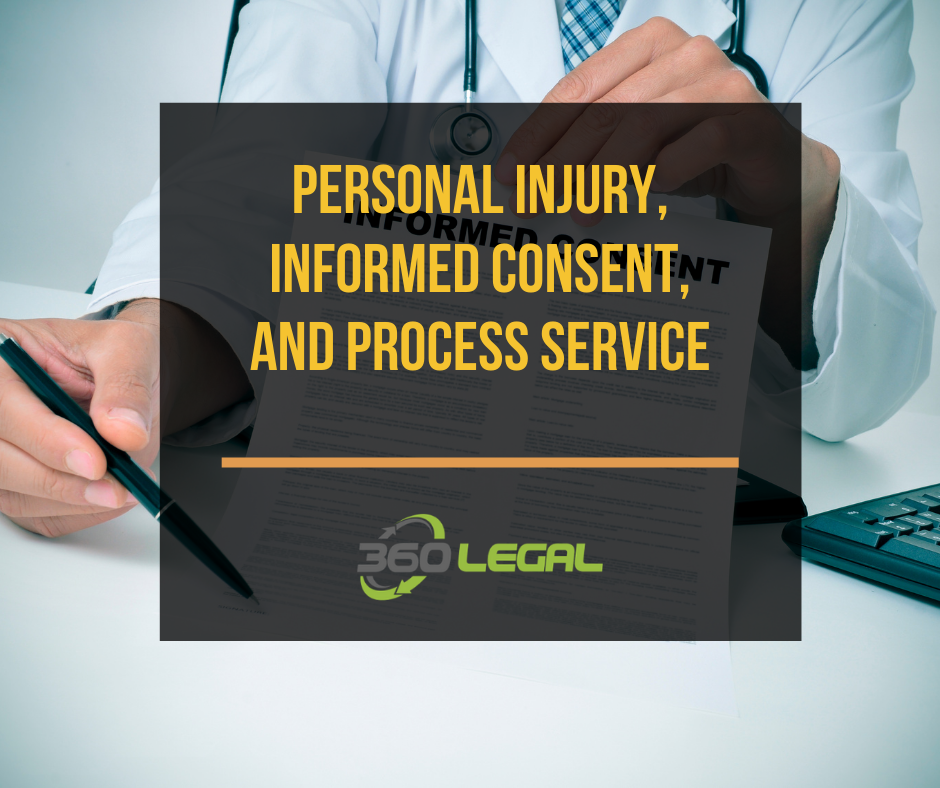Testing RSS Feeds.. ignore post.
Testing RSS Feeds.. ignore post.
Personal Injury, Informed Consent, and Process Service

Who Must Be Served Notice in a Personal Injury Lawsuit?
After a personal injury case verdict, the plaintiff may file a civil lawsuit seeking further damages from responsible parties. An early procedural requirement is properly serving legal notice to all defendants named in the civil action.
The Plaintiff’s Responsibility to Serve Defendants
The court requires the plaintiff to serve notice to any and all defendants listed in the lawsuit. This includes direct parties in the incident, like drivers, as well as third parties that may share liability, such as vehicle manufacturers. Healthcare providers are common defendants in injury-related civil suits, especially medical malpractice claims.
For example, if a plaintiff sues both the doctor and hospital involved in negligent treatment following a car accident, the court requires they serve notice to both medical parties informing them of the impending legal action. Serving notice is crucial for setting up the defendant’s accountability and compulsory participation in the case proceedings.
How Defendants are Notified of Lawsuits
The court itself does not automatically alert defendants to the fact that they are being sued in personal injury lawsuits. That legal responsibility falls squarely on the plaintiff through properly delivered service of process. Plaintiffs must hire a process-serving company or sheriff’s department to successfully notify defendants about the lawsuit through official channels.
Defendants must be made aware of the lawsuit and allegations against them to be considered liable parties obliged to mount a legal defense. If an entity fails to be served notice properly, the court cannot compel them to engage with or financially respond to the litigation. Plaintiffs risk weakly supported cases if they don’t complete comprehensive service.
Notifying Doctors and Hospitals
In medical malpractice suits within or alongside injury cases, serving notice to healthcare providers like defendant nurses, doctors, surgeons, and hospitals is necessary to implicate them. Process Serving them informs these medical defendants that a patient is pursuing legal action for medical negligence or substandard treatment.
Only properly served healthcare professionals and organizations can be held financially accountable for damages should the court rule against them. Failing to serve a doctor, for example, typically releases them from potential malpractice liability in the suit. Thorough service locks in their status as defendants.
Informed Consent Release
Additionally, when hearing medical malpractice injury cases, the presiding judge may order defendant healthcare providers to furnish applicable medical records and informed consent paperwork. By requesting plaintiff consent forms, the court compels defendants to provide documents that may demonstrate or refute adherence to adequate standards of care.
This means if you are injured and suing your treating doctor for malpractice, the court can require the doctor to share your full medical files along with imaging results, testing lab reports, and any signed consent paperwork authorizing treatment. Perusing such files assists in determining negligence.
Why Process Serving Notice Matters
At its core, formally serving notice sets binding legal accountability and compulsory participation into motion. Defendants must receive an official notice advising them of the exact case details and plaintiff demands through authorized process servers. Local sheriffs may substitute in some jurisdictions.
With liability set, named defendants must then actively respond and present an evidentiary defense or else risk unfavorable rulings and financial judgments against them. For justice to be served, ensuring parties squarely understand case implications via proper notice remains an indispensable early step.
Author
We are Social!
Latest tweets
Popular Tags
Testimonials
"5 star service ! prompt serving, helpful, professional . "
"Mike is awesome. Our firm has hired him on several occasions and we are very happy with his work. His prompt serving, helpful, professional and always in communication. I recommend him highly! "
"360Legal provides speedy and easy to use Process Service that is flexible, and very transparent with nearly instant reporting. It is very helpful for us to be able to track the status of our process service jobs, especially when they are time sensitive. "
Latest News
-

RMAI 2021 Annual Conference RMAI Annual Conference
April 12-15, 2021 -

NATIONAL CREDITORS BAR ASSOCIATION 2020 SPRING CONFERENCE
May 19-21, 2021 -

ALFN ANSWERS 2021
Jul 18-21, 2021 -

Annual Convention and Expo
Oct. 17-21, 2021 -

Florida Association of Professional Process Servers 33rd Quarter Board Meeting/Professional Beach Getaway
Aug. 20-22, 2021












